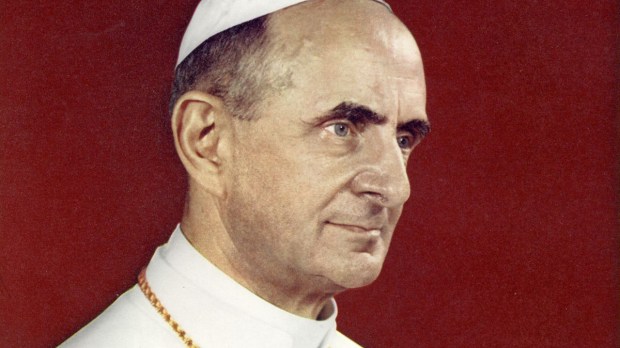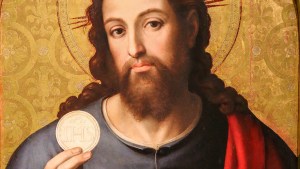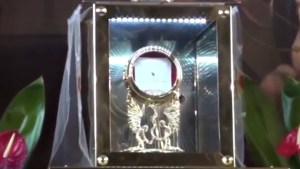One belief of the Catholic Church that is often confusing for many is the teaching that Jesus is truly present under the appearance of bread and wine in the Eucharist.
The theological name for this is “transubstantiation,” which the Catechism explains: “By the consecration of the bread and wine there takes place a change of the whole substance of the bread into the substance of the body of Christ our Lord and of the whole substance of the wine into the substance of his blood” (CCC 1376).
This means that while the appearance of bread and wine remain, the substance is changed (through the power of God) completely to the body and blood of Christ.
However, some mistakenly hold that the Eucharist is only a “symbol” of Jesus’ presence.
St. Paul VI forcefully rejected this idea and wrote about it in his encyclical, Mysterium fidei, written during the Second Vatican Council.
For the constant teaching that the Catholic Church has passed on to her catechumens, the understanding of the Christian people, the doctrine defined by the Council of Trent, the very words that Christ used when He instituted the Most Holy Eucharist, all require us to profess that “the Eucharist is the flesh of Our Savior Jesus Christ which suffered for our sins and which the Father in His loving kindness raised again.”
He went on to reinforce this belief, making it crystal clear that the Eucharist is not merely a symbol.
To these words of St. Ignatius, we may well add those which Theodore of Mopsuestia, who is a faithful witness to the faith of the Church on this point, addressed to the people: “The Lord did not say: This is a symbol of my body, and this is a symbol of my blood, but rather: This is my body and my blood. He teaches us not to look to the nature of what lies before us and is perceived by the senses, because the giving of thanks and the words spoken over it have changed it into flesh and blood.”
St. Paul VI went so far as to warn parish priests to speak boldly about this truth of the Catholic faith.
After the Council of Trent, Our predecessor, Pius VI, issued a serious warning, on the occasion of the errors of the Synod of Pistoia, that parish priests not neglect to speak of transubstantiation, which is listed among the articles of the faith, in the course of carrying out their office of teaching.
Above all, Pope Paul VI had a firm belief in the Eucharist and wanted the whole Church to fully understand this great gift to humanity.



